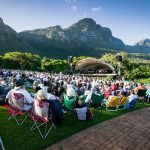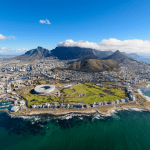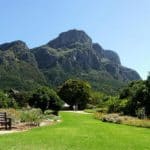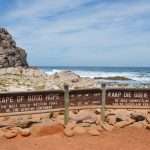To South Africans, Cape Town is the Mother City, the first European settlement on the very tip of the continent. It is also, without question, the most attractive.
Hundreds of years after it was established as a supplies post, Cape Town continues to attract Europeans in their droves. And they’re after more than the fine climate and good quality of life.
The 2010 World Cup will be an event to rival even the Olympics, and for a month will make Cape Town, one of the host cities, the focus of the world.
‘I’d be disappointed if rents during the World Cup don’t treble,’ says Mariel Burger, of Pam Golding Property, the biggest South African chain and an affiliate of the British Savills group.
In the past few years (before the worldwide economic crisis hit), property in Cape Town was appreciating in value by 40 per cent a year.
‘I bought a property for £43,000 a few years ago and sold it for £98,000 a couple of years later. And that’s typical of the enormous jump in prices,’ he says.
Sales volume is reckoned to be half what it was a year ago, forcing down prices by 10 to 20 per cent.
This means value for money has improved over the past six months – although many South Africans complain it is still impossible to buy in the city because foreigners have pushed the prices so high.
Most British buyers purchase a flat in the centre of town – known as the City Bowl – or a house on the Atlantic sea board.
Many developments were planned during the property boom and are completing now, so the drop in demand means there are bargains to be had.
The City Bowl is the setting for The Orangerie, an impressive 8,000sqm development of large flats about to be finished and available through Propvantage.
Around the corner from Kloof Street, the restaurants, bars and cultural centre of the town, the Orangerie has fine views over the city and the mountains above it.
Remaining units cost from £155,000 for a single-level, one-bedroom flat with a balcony, to £272,600 for a two-floor flat with two bedrooms, two bathrooms and a garden – and gardens grow well in Cape Town’s year-round sun.
Waning demand means you would be in a pretty good position to try negotiating on the price. And as the South African buying process is modelled on the English system, it should be transparent and reliable.
But there is one problem looming over Cape Town – power shortages. The end of apartheid saw huge numbers moving from the countryside to the major cities and the infrastructure couldn’t cope.
Blackouts are common and can cause big problems – not least for the poor tourists who were stuck five hours in a cable car half-way up Table Mountain.
Similar to British schemes over the past few years, there has also been a trend for converting attractive old buildings into blocks of flats.
So if you are looking for something with more character, you could do far worse than investigate the Majestic development (00 27 83 617 3419, Propvantage.com.).
It is based around the old Majestic hotel in Kalk Bay, once a fishing village along the coast from the city, but now regarded as a suburb.
There is a range of properties available, from townhouses on the hillside above the Edwardian hotel, to apartments within the old hotel itself.
These include the two-bedroom £818,000 penthouse or the huge two-bedroom, two-bathroom apartment carved out of the hotel’s dining room (and including the original fireplace, providing for a few romantic nights in).
It has its own extensive garden and is on the market for £622,000. ‘Because the hotel is so old, the architects who designed the conversion were restricted on what they were allowed to do, so they had to be creative,’ says Tina Roberts, from Pam Golding.
‘There are huge columns throughout and all the doors and windows are reclaimed. People are buying into a lifestyle – I think the Majestic has done for Kalk Bay what Brigitte Bardot did for St Tropez.’
Kalk Bay village was created in 1742 when the Dutch East India Company made nearby Simon’s Bay a winter anchorage for its ships.
In the 1840s, a shipwrecked Filipino crew settled in Kalk Bay, where they found the abundance of fish almost too good to be true.
A fishing community grew, with the Filipinos living alongside emancipated slaves. In 1883 the railways arrived and the population multiplied.
Prices in the current phase of the development start at £140,000 for a one-bedroom flat in a converted Thirties building overlooking the harbour.
As well as a gym and restaurants, residents have the use of a spa set in the Majestic hotel’s ballroom with many of the charming original features still in situ.
Britons Nick and Annie Godwin bought a flat in the development two years ago.
Nick says: ‘We used to visit that area for The Argus Cycle Tour, an annual cycle race held in the Cape Town area. We hadn’t really thought about buying there.
‘Then we saw this two-bedroom apartment with a little garden and nice views over the port and thought how beautiful it was. We paid about three million rand, which was around £200,000 and pretty good value.
‘We spend a couple of months a year there, but intend to spend more as we reduce our commitments in Britain. There is a rental value, but we don’t let it because we’ve made it our own.
‘Kalk Bay is old-world with nice shops and there’s a lot of regeneration. I’m retired now and, as an investment, I’m sure it will do well and, as a lifestyle change, it’s terrific compared to Europe.
‘Cape Town has a great energy. It’s an extraordinarily beautiful, diverse place. I have great optimism for South Africa.’
Source: Daily Mail





